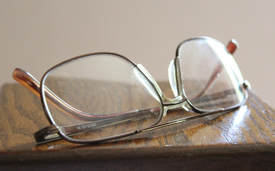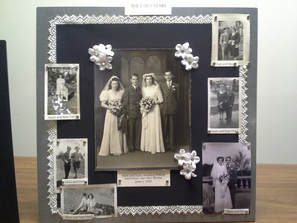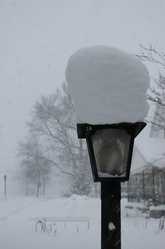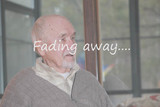|
Eldercare frequently throws you a curve ball. Just when you think you are in your groove, things change. That’s what happened to us this Thanksgiving.
Our plan was to spend the mid-afternoon with Dad and have lunch with him. He no longer knows the days, dates, or holidays. We do these things more for ourselves than for Dad, really. We visit almost daily and that’s what is most satisfying for him. But we still want to give him a sense of festivity so we try to make holidays special. However, Dad woke up very confused. He was convinced it was WWII and that he had eaten something bad and was confined to bed and wasn’t supposed to eat. There are still times when he’ll have a kernel of truth, but embellish a story to make sense to his confused mind. So I went in search of the shift nurse to see if he’d had some sort of reaction to food lately. No, she said. He was just very confused. I went back to the room and tried a different tactic. In the past, I’ve been able to get him out of bed and dressed. And slowly get him out of his room to either have something to eat or go for a short walk. But not this day. He was not going to get out of that bed. No way, no how, no time, no place. No. So I read a card his daughter had sent him, showed it to him and then after a very short visit, we left. The next day he did get out of bed, but still refused to eat. It may be that we’ve entered into a new part of this journey. Earlier this year, Hospice got involved with Dad’s care, but then he improved to a point where they signed off. We will be monitoring the situation and may be getting them back into the care team. So this Thanksgiving, we are grateful for many things that include a great care team for Dad, for a lovely, safe place close by, and for the work and ministry of Hospice. Peace be with you.
0 Comments
 There was a note on the kitchen table. Fix Dad’s glasses. “Did his glasses fall apart again?” I asked Mike. “Yep.” “What happened this time.” “I don’t know. The lens fell out.” I looked at the glasses. “You mean both lenses fell out,” I said. Mike came over to look. “What?? I just had the technician put on bolts to the screws to keep them in longer!” “I think Dad may have undone them, although where he got a screwdriver to do it, I have no idea.” “No, he just keeps stepping on them. There’s no way he could see and concentrate to do that.” And so Mike took Dad’s glasses in for another repair. We talked about maybe not bothering with his glasses anymore since he can’t read and doesn’t watch TV (the remote is too complicated for a dementia patient). But he does need them to be able to see his plate when he’s eating a meal. That lasted for about a month. Dad breaking them, Mike taking them in to be fixed. And just as suddenly as it started, it stopped. Then some other behavior changed that we had to problem solve. And so it goes with caregiving for a dementia patient. You barely have time to get your bearings, when the problems change and you need a new strategy. Never a dull moment.  Easter was cold, but the sun was shining brightly. Our plan for the day was to celebrate with Dad. I reminded Mike we needed to get there early in the likely event we’d have to get Dad dressed, or rather re-dressed. Lately, even when the aids get him up and about, he goes back to his room and gets undressed by himself and getting him to put his clothes back on is quite a process. As I suspected, Dad was not ready for an Easter luncheon. He wasn’t even out of bed, and didn’t want to get out of bed. We started our negotiations. “Get up, Dad, and we’ll have an Easter dinner together.” “No, why don’t we have it in here?” “No, it’s a lovely day. Get dressed and we’ll go to the dining room together.” “You go without me.” “Dad, we came to be with you. Going without you defeats the whole purpose.” “Oh. Okay.” But he makes no move to get up. “It’s Easter, Dad. I’ve made you a present.” “You did?” “Yep. But you have to get up and get dressed to get it.” “Let me see what it is first.” He smiled. It was going to be a good day. So good, in fact, that when he got up he as able to dress himself. The aids came in to get him to the dining room and were delightfully surprised that he was almost ready to go. Dad joked with them and when they left he told me he had a strategy to make all the staff like him. If only he remembered that strategy when he got angry and threw things at them. But today, for now, he was in good form and we went to the dining room together and joined another patient whose family was not able to be with her. The conversation around the table was disjointed. Dad was deep into childhood memories, our table companion had developed certain coping mechanisms to cover her memory loss and both were chatting away about different things and were at peace. The sun shone brightly in the large room, we shared a meal together, and calm reigned for the day. I found great joy in that. When dealing with dementia, finding joy is vital. For those of you in the Western tradition - hope you had a Happy Easter. For those of you who celebrate Passover, Shalom! May your Pesach overflow with happiness! For those of you in the Orthodox tradition who will celebrate Easter this weekend, Kaló pásha ...Happy Greek Easter! May you be blessed. May you find peace.  When Mom Kemper died, our world changed drastically and quickly. While planning the funeral, we also had to find a memory care facility with an immediate opening where we could transfer Dad. We had to tend to out-of-town guests, empty Mom and Dad’s apartment, prepare a new place for Dad, and deal with some of health issues. Since the weather was cold, we postponed having an interment ceremony until warmer weather came. But once summer came a variety of other life issues needed tending and again the interment was postponed. We finally got everyone together and scheduled a date to have Mom’s ashes placed at Fort Custer National Cemetery in Battle Creek. Mike’s sister came to town from out of state, and Mom’s brother and his wife met us at the cemetery. When we had started out from Grand Rapids, it had been overcast and cool. But as we sat in the shelter while the deacon spoke words of comfort, the sun was out and it was a lovely autumn day. A good day to remember Mom and I was thankful for that small blessing. Of course, Dad had no idea what was happening. As Mike drove, I sat with him in the back seat and he’d ask me where Donna was (that would be me), where were we going, where’s Mom, what were we doing, and some other questions that didn’t make sense. I kept distracting him by pointing out the changing colors of the trees which he really didn’t engage with. But he was really interested in any truck dealerships or RV dealerships we passed. When I spotted one, I’d point it out and exclaim, “Wow, Dad! Look at all those trucks!” and that would help for about a minute or two before he started wondering what was happening. After our time at the cemetery we had a late lunch together and by the time we were finished it was getting to be about four in the afternoon. Dad was beginning to go deeper into his confused state. A couple evenings before we’d had an episode of sundowners syndrome and it looked like we’d be having another. Sundowning is a state of confusion and agitation that occurs in the late afternoon into the night with dementia patients. We’d had a very busy week and it was taking a toll on Dad. We did our best to get him home and settled. All the traveling is done now, the visitors are gone, and Dad is getting back to his regular schedule. But he still asks me where Mom is. If you want to know more about sundowners syndrome there’s a helpful description of it on Mayo Clinic’s website. You can find it here: http://www.mayoclinic.org/diseases-conditions/alzheimers-disease/expert-answers/sundowning/faq-20058511  Lenten Rose Lenten Rose The day before Easter was truly glorious with temperatures in the seventies and lots of sunshine. I spent most of the day doing yard work and when it was time to get cleaned up, Mike and I decided this would be a good day to take Dad out to dinner. We would celebrate Easter on Saturday since Sunday was supposed to be cooler and raining. Dad, of course, had no idea it was Easter weekend. But he was having a good day and was happy to see us. He was willing to go out to dinner with us, so Mike signed him out and we tucked him into the car, buckled his seat belt, and we were off. The last time we took him out for dinner was to Olive Garden. He and Mom loved the Tuscan soup they serve but it was obvious that the crowds, the menus, and the attentive servers were overwhelming Dad. Since our goal was to have a pleasant and celebratory experience, I guided the car to Bob Evans. While it’s not the first place that comes to mind when celebrating a holiday, it is smaller, quieter (at least on a Saturday afternoon), and easier for a dementia patient to navigate. Our waitress picked up that Dad had problems ordering and graciously worked around that. Dad got his burger and coffee and was happy. While we had the same conversation over and over, I was able to inject humor and keep Dad laughing and having a good time. Mike was greatly relieved. I had brought my barber kit with me in the hopes of convincing Dad to let me give him a trim when we got back to the apartment. He was getting shaggy and we’d asked the aids not to give him trims anymore because it really upsets him. In his mind, he thinks people are shoving themselves into his apartment to sell him things and he’s agitated for days. Happily, during dinner Dad asked if we could stop and buy a scissors for him to trim his mustache. I told him I brought a kit to do the job when we got back and no coaxing was necessary. All in all, it was a good day which made me so happy for Mike. He’s experiencing what I experienced when I was caring for my mother. When with other people, my mom and now Dad can be all smiles and very charming. But when I was alone with Mom she would be impossible. Dad is doing that to Mike each day when he stops in after work. He can be very unpleasant, agitated and demanding. There are times he accuses Mike of lying about Mom Kemper or about Dad’s memory and it wears on my husband. This day and outing was a gift and we appreciate it. After we said our goodbyes, Mike and I were walking to the car together. I mentioned how nice it was that Dad had such a good day. Mike hugged me to his side. “You’re good medicine for him,” he said, and kissed my cheek. With those moments of encouraging one another, we keep moving ahead.  It’s 5:30 a.m. and the phone is ringing again. Mike is so exhausted he doesn’t hear this time and I don’t hear his sister stirring, either. This is an answer to prayer because I want them to be able to rest. I get up to take the early morning shift. I’m not quick enough and the answering machine is getting it, but I’m not concerned. It will ring again and as I reach the bottom of the stairs, it starts. I’m thankful he’s forgotten about the cell phones. Mike’s is in the bedroom and it’s jolted him awake several times already. “Hello?” I answer. “Uh, well…uh, is this Mike?” “No, Dad. It’s Donna.” “Can I talk to Mike?” “No, Dad. It’s 5:30 and he’s in bed. He needs to sleep and I’m not waking him up.” “Oh. Uh. Well, do you have a minute?” “Yes, Dad,” and I sit on the stairs. It will be a while. “I’m completely bewildered. I can’t find Anne.” “No, Dad. She died.” “Who died.” “Mom died.” “My mother?” “No, Mike’s mother. Anne. Your Anne has died.” “My mother, Anne?” “No, Dad. Your wife.” His mother’s name was not Anne. “My wife?” “Yes.” “How did that happen.” “Her lungs wore out, Dad.” “Where was I?” “You were holding her hand.” “Here in the house?” “Yes, Dad, the apartment. You were holding her hand, I was reading the psalms to her, and Mike was stroking her hair.” “Did she suffer?” “No, Dad. It was peaceful.” “Why can’t I remember?” “Your memory has been bad for a few years, now.” He will accept this from me. He called Mike a liar last night. “I can’t remember any of this.” “I know.” “Is Mother with you?” “No, Dad. She died.” “Was there a funeral?” “No, Dad. It will be Friday.” “What day is today?” “It’s Wednesday.” “What should I do?” “Go back to bed, Dad.” “I found a note here. Did something happen?” “Mom’s gone, Dad.” “I have to go get her.” “You can’t, Dad. She’s died. We’ll have a private viewing today. Your daughter came to town yesterday and spent the day with you and we’re going to go see Mom one last time.” “When?” “At 11 o’clock.” “Will I go?” “Yes, Dad. We’ll come get you.” “Has there been a funeral?” “Not yet.” “Has something happened?” And on it goes for another five minutes or so. Suddenly he’s done and hangs up. I go to make a cup of coffee and clean up the kitchen a bit. The phone rings.  It was Christmas morning in the sick house. I’d been ill for days with no relief in sight and it looked like Mike had come down with this virus from hell as well. Dad was moved to memory care and was not doing well and I’d yet to go over to visit. We had to clear out the old apartment within a month but I could barely get out of bed. I did not send out Christmas cards, I did not finish my Christmas shopping, I had not made any meal preparations, and frankly had no desire to eat. I was watching the Nutcracker the night before and thought of calling my mother-in-law to tell her it was on when I remembered she was gone. This was possibly the worst Christmas ever. I know for sure it was the worst one for Mike. My own mother made Christmas a nightmare until she disconnected from me for a blessed decade. Up to that point, I would go into the season wondering what sort of mayhem she would create. She never failed to disappoint. As a result, I don’t have high expectations of the season. I don’t have children or grandchildren to lavish gifts and time on, the family I do have left is greatly diminished, and due to caregiving I have no spare time for volunteerism. The church I was attending decided to close, and even if I had a place for a Christmas Eve service (and there are plenty to choose from in this city of churches) I am too sick to participate. These thoughts caused me to wonder if I could remember a good Christmas. I had to go back to my childhood when I was living with my grandparents. Christmas eve service at midnight and as we left each child would get a box of candy. There was always one really good piece of chocolate in that box. The night would be quiet and crisp and the car would be warm as we drove home. This was in the days before car seats and I could lie stretched out on the back seat looking up at the stars as Grandpa drove. The next morning the tree was up and presents were under it. Grandma had been baking Christmas cookies for weeks and now we could have as many as we wanted. The house was filled with the aroma of food cooking. Mom had driven in from Detroit and we were all together. Grandma kept things on an even keel, but once she was diagnosed with cancer, things went downhill and Christmas was never the same. This virus that I’ve been railing against is actually a gift. It’s made me stop to consider where I am in life. I’m coming toward the finish line. Who knows how many years we have, but I’m definitely past the half way mark. My mother-in-law is gone, and I suspect my father-in-law will die of a broken heart. He’s 95 with Alzheimer’s and can’t find his wife. My time as a caregiver is drawing to an end for now. It is time to plan on making good memories. Happy New Year. There’s an expression I recall from the Old Testament. “And when he was full of years, he was gathered to his fathers.” It is such a poetic expression of death. I love the imagery of it. Being gathered into the arms of those who have loved you and gone on before. I find it beautiful.
Mom Kemper was full of years. Ninety five and a half, to be exact. Now she has been gathered to her mothers and fathers. She had a very smooth transition at home in her bed with her husband of seventy three years holding her hand, her son stroking her hair, and her daughter-in-law reading psalms sitting next to her. We were so blessed to be together as she passed. We are deeply grieving. Dad doesn’t remember the experience and finds out over and over again, grieving anew each time. He calls in the middle of the night to tell us Mother has gone somewhere and do we know when she'll be back. It is heartbreaking. Because of all a death entails with the addition of caring for a grieving dementia patient, this blog will be on hiatus. Prayers are always appreciated. There is an excellent video series on VideoWest documenting a woman's descent into dementia. In 2010, Gera Saunders learned she has dementia. She was 61 at the time of her diagnosis and a professor at the University of Utah.
To view the series (at this writing there are three videos and will be more later), go to http://videowest.kuer.org/gerda-series/ It gives you the perspective of being the person cared for rather than the caregiver. I highly recommend it. While you may not agree with her stance on end of life, she gives us a glimpse into her life and her family as they deal with this unwanted life event.  The other evening, my husband and I were driving together. It’s rare these days to have a moment of privacy so I took the opportunity to ask him how he was doing. At first he gave me the standard, “Fine” answer but I dug deeper. With all that’s coming at us with Mom in rehab and trying to keep Dad safe on his own, work and the daily situations of life like car repair, I wanted to know what was really on his heart. “No,” I said. “How are you really doing? How are you handling all that’s coming at you right now?” He looked ahead and sighed. “I feel as if I’m watching a train wreck in slow motion and there’s nothing I can do to stop it,” he said. Tears welled up in my eyes and I reached over for his hand. There was nothing I could say. It was an apt description of watching a parent succumb to Alzheimer’s. Meanwhile, across town, a friend of mine was coming home after being at the hospital all day with her mother. She was exhausted, developing a sore throat and deeply discouraged. Her mother had driven into a tree in the parking lot of her apartment complex. She had a broken nose, the front end of the car was a mess but she had no recollection of the accident. She doesn’t understand why everyone keeps telling her her memory isn’t good, nor why they want her to stop driving. In yet another part of town, a niece was trying to spend time recollecting with her confused uncle who had severely broken a hip after a fall and would pass away a couple days later, leaving a wife who also has dementia. And on it goes. I could tell you about an aunt who lives in Texas and was found in Oklahoma after driving for a day and a half, forgetting where she was going, or the woman who left her apartment in Ohio on foot, trying to find her house in Chicago. She hadn’t lived there in over fifty years. Currently, there are over 5 million people in America with Alzheimer’s and each of them have a story. Their story, in turn, ripples out to touch others. Millions of people are involved with either developing this disease or caring for someone with it. Dementia is taking a huge toll on individuals, families, communities and the nation. And yet, a chronic underinvestment in Alzheimer’s research persists. If you are interested in advocating for more funding for a disease that none of us is safe from, please consider writing your representative. You can go to https://act.alz.org/site/Advocacy?cmd=display&page=UserAction&id=1295 to fill out a form urging action. |
Archives
July 2024
Donna KemperDonna Kemper put aside her art career to care for a mother she hadn't seen in over a decade. For seven years she followed her mother's journey into dementia, caring for her and putting forgiveness into action. Categories
All
|

 RSS Feed
RSS Feed